
SCARS Institute’s Encyclopedia of Scams™ Published Continuously for 25 Years

SCARS™ Subject Focus: The Psychology Of Romance Scams
Romance Scams Are Infinitely Complex And Leave Victims With Significant Trauma
Attention is like a spotlight, which means when it’s pointing in one direction it pretty much ignores everything else. This is how a Romance Scam starts!
Except people don’t realize how little information coming in from the outside world we actually process. Naturally, you don’t notice what you don’t notice, plus the mind is designed to fill in the gaps for us. But fraudsters do know and almost every con uses some kind of distraction – a kind of social engineering to get you to do what the scammer wants you to do.
Scammers know all about social compliance and happily exploit our automatic deference to authority figures such as soldiers. People will hand over credit cards to people they think are waiters, car keys to people they think are car park attendants and give access to their house to people they think are from the water board. The best known online example is a ‘phishing attack’ where people give fraudsters their bank details in response to an email that purports to be from their bank.
These are just the tip of the iceberg when it comes to social engineering scams. To truly learn how victims are manipulated and all of the mechanisms involved, we invite you to read our SCARS Library (below) on the subject of the Psychology of Romance Scams!
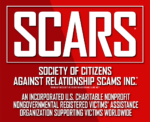
SCARS™ Team
A SCARS Division
Miami Florida U.S.A.
TAGS: Psychology of Scams, Romance Scams, Social Compliance, Amygdala Hijack, Gaslighting, Stranger Trust, Trauma Bonding, PTSD, Victim Syndrome, Complex, Syndromes, Victimization,
END
– – –
Tell us about your experiences with Romance Scammers in our Scams Discussion Forum on Facebook »
– – –
FAQ: How Do You Properly Report Scammers?
It is essential that law enforcement knows about scams & scammers, even though there is nothing (in most cases) that they can do.
Always report scams involving money lost or where you received money to:
- Local Police – ask them to take an “informational” police report – say you need it for your insurance
- Your National Police or FBI (www.IC3.gov)
- The SCARS|CDN™ Cybercriminal Data Network – Worldwide Reporting Network HERE or on www.Anyscam.com
This helps your government understand the problem, and allows law enforcement to add scammers on watch lists worldwide.
– – –
Visit our NEW Main SCARS Facebook page for much more information about scams and online crime: www.facebook.com/SCARS.News.And.Information
To learn more about SCARS visit www.AgainstScams.org
Please be sure to report all scammers HERE or on www.Anyscam.com
All original content is Copyright © 1991 – 2020 SCARS All Rights Reserved Worldwide & Webwide – RSN/Romance Scams Now & SCARS/Society of Citizens Against Relationship Scams are all trademarks of Society of Citizens Against Relationship Scams Incorporated (formerly the Society of Citizens Against Romance Scams)
Legal Notices:
All original content is Copyright © 1991 – 2020 SCARS All Rights Reserved Worldwide & Webwide. Third-party copyrights acknowledge.
SCARS, RSN, Romance Scams Now, SCARS|GLOBAL, SCARS, Society of Citizens Against Relationship Scams, Society of Citizens Against Romance Scams, SCARS|ANYSCAM, Project Anyscam, Anyscam, SCARS|GOFCH, GOFCH, SCARS|CHINA, SCARS|CDN, SCARS Cybercriminal Data Network, Cobalt Alert, Scam Victims Support Group, are all trademarks of Society of Citizens Against Relationship Scams Incorporated.
Contact the law firm for the Society of Citizens Against Relationship Scams Incorporated by email at legal@AgainstScams.org
-/ 30 /-
What do you think about this?
Please share your thoughts in a comment below!
Table of Contents
- Romance Scams Are Infinitely Complex And Leave Victims With Significant Trauma
- How Scam Survivors Can Survive Valentine’s Day – 2026
- 7 Deadly Sins of Post Scam Victim Vulnerability – 2023 UPDATED 2026
- Elicitation – A Scammer’s Manipulation Technique – 2025
- Your Mother is in a Romance Scam – Now What Do You Do? – 2025
- Manipulative Underspecification – a Powerful Manipulation Technique Used by Scammers – 2025
- eBay Storytelling Scams – eCommerce Fakery – 2025
- Why Young Adults and the Elderly are Most Vulnerable to Cybercrime – 2025
- Scammers’ Anonymity – What is Behind the Fake Identity – 2025
- Why People Spread Urban Legends Half-Truths and Conspiracy Theories – 2025
- Forcing Functions – A Comprehensive Approach to Reducing Scams – 2025
- A Women’s Guide to Returning to Dating After a Romance Scam – 2025
- A Men’s Guide to Returning to Dating After a Romance Scam – 2025
- The 20 Essential Axioms of Scam Victim-Survivor Recovery – 2024
- Inside the Predator’s Mind: How Scammers Exploit Vulnerabilities to Trap Their Scam Victims – 2024
- Yahoo Yahoo Formats – Relationship/Romance Scam Scammer Scripts – 2024
- SCARS’ Law Based on Murphy’s Law – ‘If Anything Can Go Wrong It Will’ – a Primary Law of Cybercrime – 2024
- The 3 Types of Grooming That Are Hard to Spot – 2024
- Subliminal Messaging: A New Scammer’s Tool Against Scam Victims – 2024
- Danielle Delaunay – An Analysis of Her Value to Romance Scammers – 2024
- The Family of Scam Victims are Also Victims! Understanding How This Works in Families of Relationship Scam Victims – 2024
- Tell us about your experiences with Romance Scammers in our Scams Discussion Forum on Facebook »
- Please be sure to report all scammers HERE or on www.Anyscam.com
LEAVE A COMMENT?
Recent Comments
On Other Articles
- Arwyn Lautenschlager on Love Bombing And How Romance Scam Victims Are Forced To Feel: “I was love bombed to the point that I would do just about anything for the scammer(s). I was told…” Feb 11, 14:24
- on Dani Daniels (Kira Lee Orsag): Another Scammer’s Favorite: “You provide a valuable service! I wish more people knew about it!” Feb 10, 15:05
- on Danielle Delaunay/Danielle Genevieve – Stolen Identity/Stolen Photos – Impersonation Victim UPDATED 2024: “We highly recommend that you simply turn away form the scam and scammers, and focus on the development of a…” Feb 4, 19:47
- on The Art Of Deception: The Fundamental Principals Of Successful Deceptions – 2024: “I experienced many of the deceptive tactics that romance scammers use. I was told various stories of hardship and why…” Feb 4, 15:27
- on Danielle Delaunay/Danielle Genevieve – Stolen Identity/Stolen Photos – Impersonation Victim UPDATED 2024: “Yes, I’m in that exact situation also. “Danielle” has seriously scammed me for 3 years now. “She” (he) doesn’t know…” Feb 4, 14:58
- on An Essay on Justice and Money Recovery – 2026: “you are so right I accidentally clicked on online justice I signed an agreement for 12k upfront but cd only…” Feb 3, 08:16
- on The SCARS Institute Top 50 Celebrity Impersonation Scams – 2025: “Quora has had visits from scammers pretending to be Keanu Reeves and Paul McCartney in 2025 and 2026.” Jan 27, 17:45
- on Scam Victims Should Limit Their Exposure To Scam News & Scammer Photos: “I used to look at scammers photos all the time; however, I don’t feel the need to do it anymore.…” Jan 26, 23:19
- on After A Scam, No One Can Tell You How You Will React: “This article was very informative, my scams happened 5 years ago; however, l do remember several of those emotions and/or…” Jan 23, 17:17
- on Situational Awareness and How Trauma Makes Scam Victims Less Safe – 2024: “I need to be more observant and I am practicing situational awareness. I’m saving this article to remind me of…” Jan 21, 22:55
ARTICLE META
Important Information for New Scam Victims
- Please visit www.ScamVictimsSupport.org – a SCARS Website for New Scam Victims & Sextortion Victims
- Enroll in FREE SCARS Scam Survivor’s School now at www.SCARSeducation.org
- Please visit www.ScamPsychology.org – to more fully understand the psychological concepts involved in scams and scam victim recovery
If you are looking for local trauma counselors please visit counseling.AgainstScams.org or join SCARS for our counseling/therapy benefit: membership.AgainstScams.org
If you need to speak with someone now, you can dial 988 or find phone numbers for crisis hotlines all around the world here: www.opencounseling.com/suicide-hotlines
A Note About Labeling!
We often use the term ‘scam victim’ in our articles, but this is a convenience to help those searching for information in search engines like Google. It is just a convenience and has no deeper meaning. If you have come through such an experience, YOU are a Survivor! It was not your fault. You are not alone! Axios!
A Question of Trust
At the SCARS Institute, we invite you to do your own research on the topics we speak about and publish, Our team investigates the subject being discussed, especially when it comes to understanding the scam victims-survivors experience. You can do Google searches but in many cases, you will have to wade through scientific papers and studies. However, remember that biases and perspectives matter and influence the outcome. Regardless, we encourage you to explore these topics as thoroughly as you can for your own awareness.
Statement About Victim Blaming
SCARS Institute articles examine different aspects of the scam victim experience, as well as those who may have been secondary victims. This work focuses on understanding victimization through the science of victimology, including common psychological and behavioral responses. The purpose is to help victims and survivors understand why these crimes occurred, reduce shame and self-blame, strengthen recovery programs and victim opportunities, and lower the risk of future victimization.
At times, these discussions may sound uncomfortable, overwhelming, or may be mistaken for blame. They are not. Scam victims are never blamed. Our goal is to explain the mechanisms of deception and the human responses that scammers exploit, and the processes that occur after the scam ends, so victims can better understand what happened to them and why it felt convincing at the time, and what the path looks like going forward.
Articles that address the psychology, neurology, physiology, and other characteristics of scams and the victim experience recognize that all people share cognitive and emotional traits that can be manipulated under the right conditions. These characteristics are not flaws. They are normal human functions that criminals deliberately exploit. Victims typically have little awareness of these mechanisms while a scam is unfolding and a very limited ability to control them. Awareness often comes only after the harm has occurred.
By explaining these processes, these articles help victims make sense of their experiences, understand common post-scam reactions, and identify ways to protect themselves moving forward. This knowledge supports recovery by replacing confusion and self-blame with clarity, context, and self-compassion.
Additional educational material on these topics is available at ScamPsychology.org – ScamsNOW.com and other SCARS Institute websites.
Psychology Disclaimer:
All articles about psychology and the human brain on this website are for information & education only
The information provided in this article is intended for educational and self-help purposes only and should not be construed as a substitute for professional therapy or counseling.
While any self-help techniques outlined herein may be beneficial for scam victims seeking to recover from their experience and move towards recovery, it is important to consult with a qualified mental health professional before initiating any course of action. Each individual’s experience and needs are unique, and what works for one person may not be suitable for another.
Additionally, any approach may not be appropriate for individuals with certain pre-existing mental health conditions or trauma histories. It is advisable to seek guidance from a licensed therapist or counselor who can provide personalized support, guidance, and treatment tailored to your specific needs.
If you are experiencing significant distress or emotional difficulties related to a scam or other traumatic event, please consult your doctor or mental health provider for appropriate care and support.
Also read our SCARS Institute Statement about Professional Care for Scam Victims – click here to go to our ScamsNOW.com website.


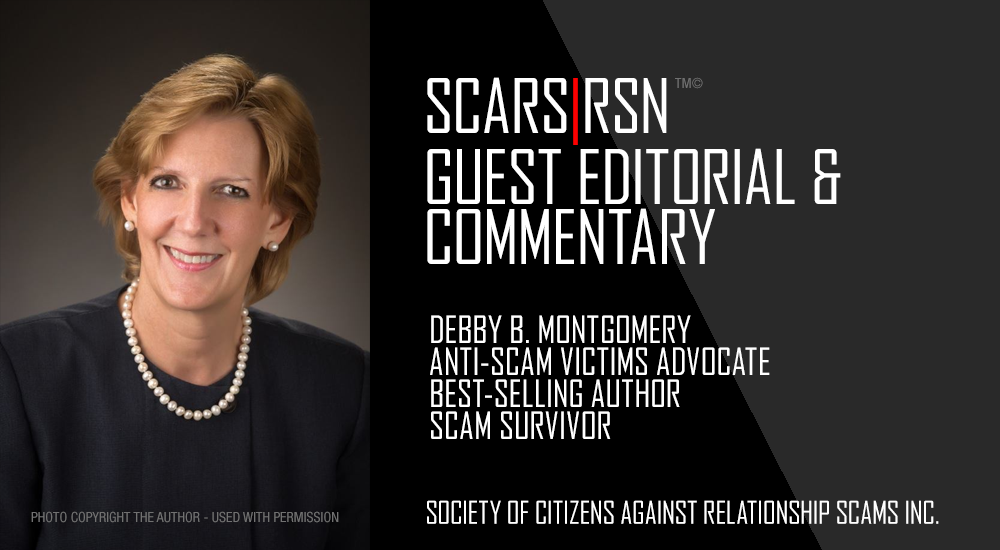

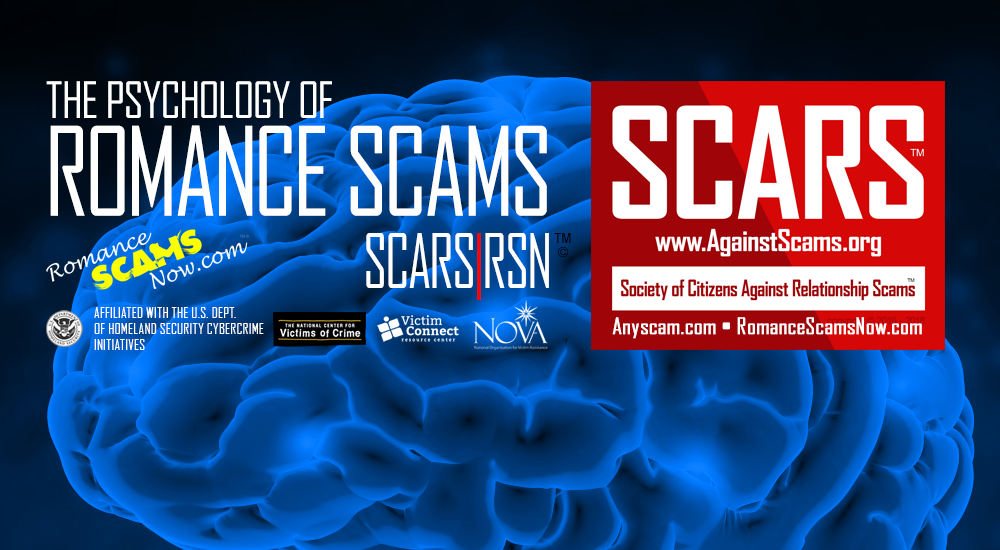

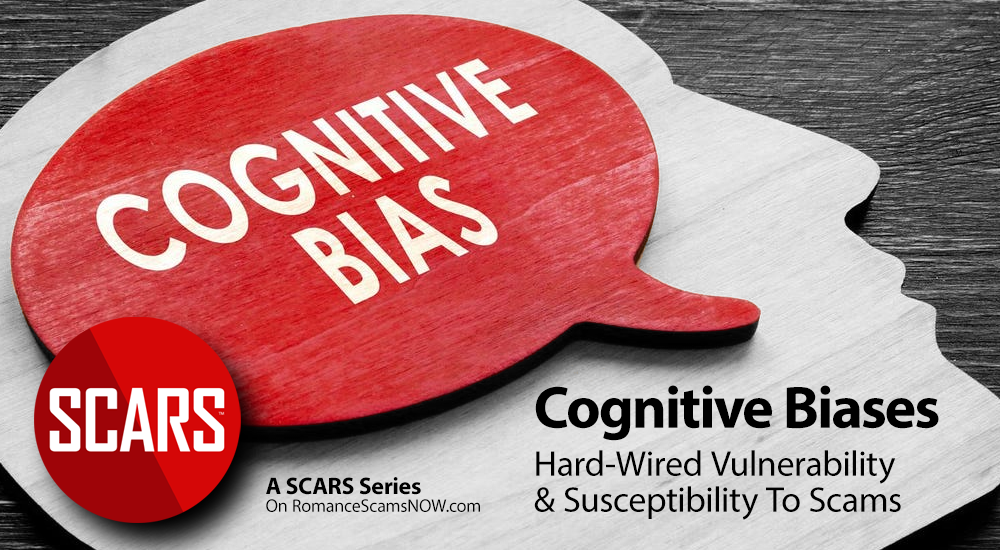
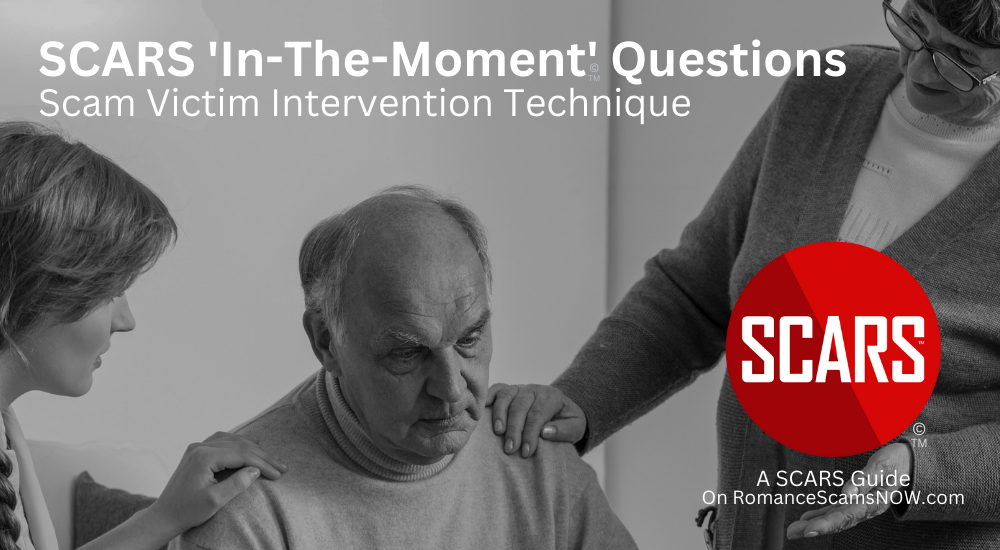
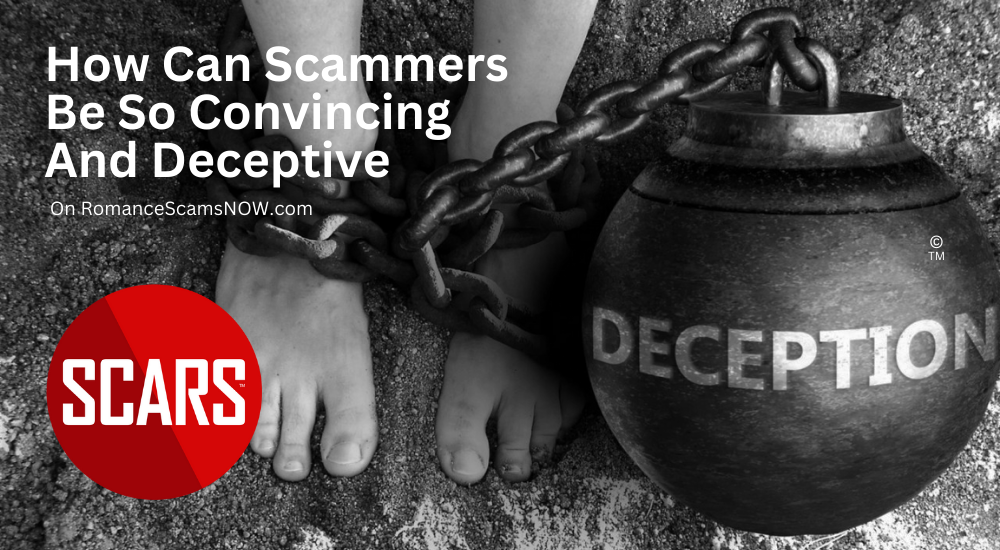

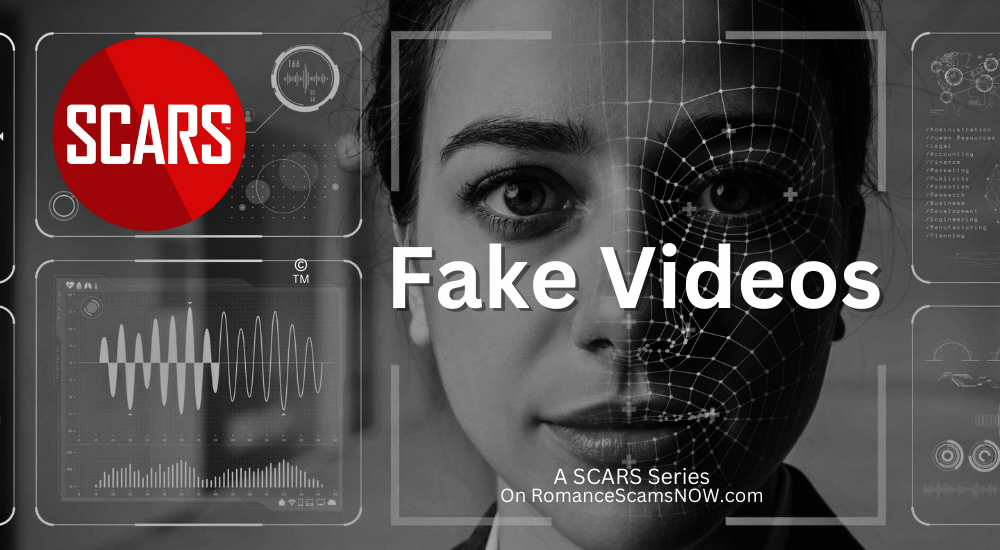


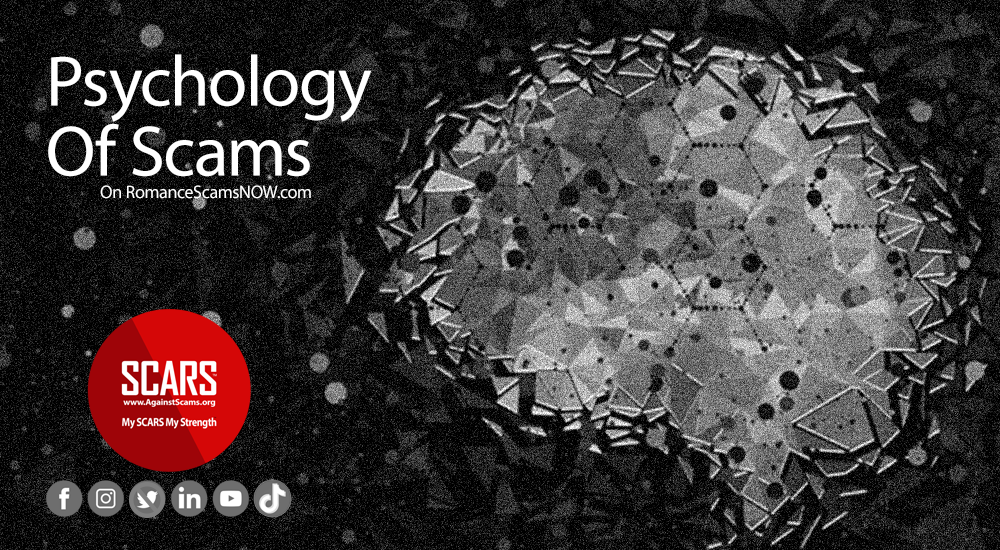
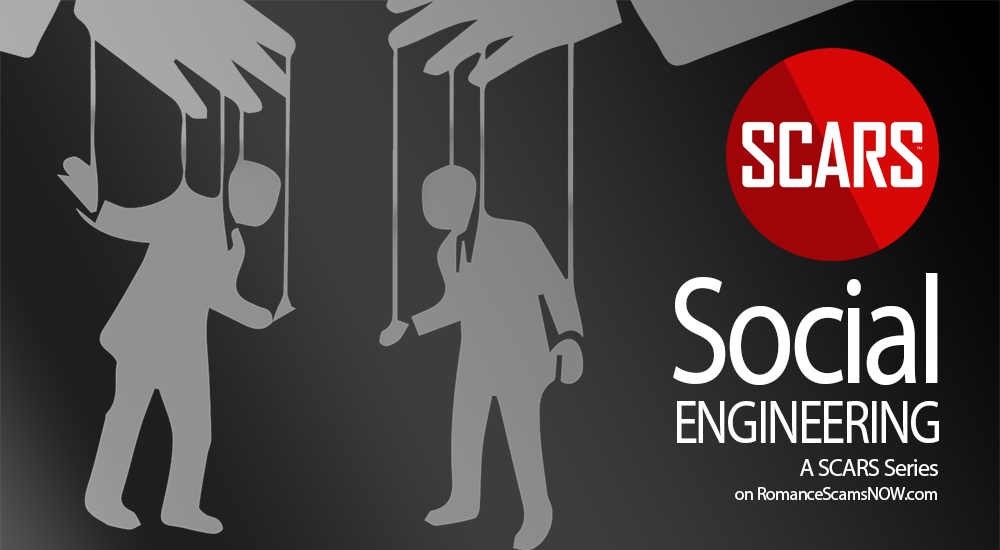



![To Be A Scammer? An Overview Of Scammers Fraudsters & Online Con Artists - 2024 [UPDATED] what is a scammer what-is-a-scammer](https://romancescamsnow.com/wp-content/uploads/2021/10/what-is-a-scammer.png)
![New Research Study on Stolen Valor - Military Scams - STUDY NOW COMPLETED [UPDATED] Military Impersonation Research Study New Research Study on Stolen Valor - Military Scams](https://romancescamsnow.com/wp-content/uploads/2022/03/Military-Impersonation-Research-Study.png)







Thank you for your comment. You may receive an email to follow up. We never share your data with marketers.